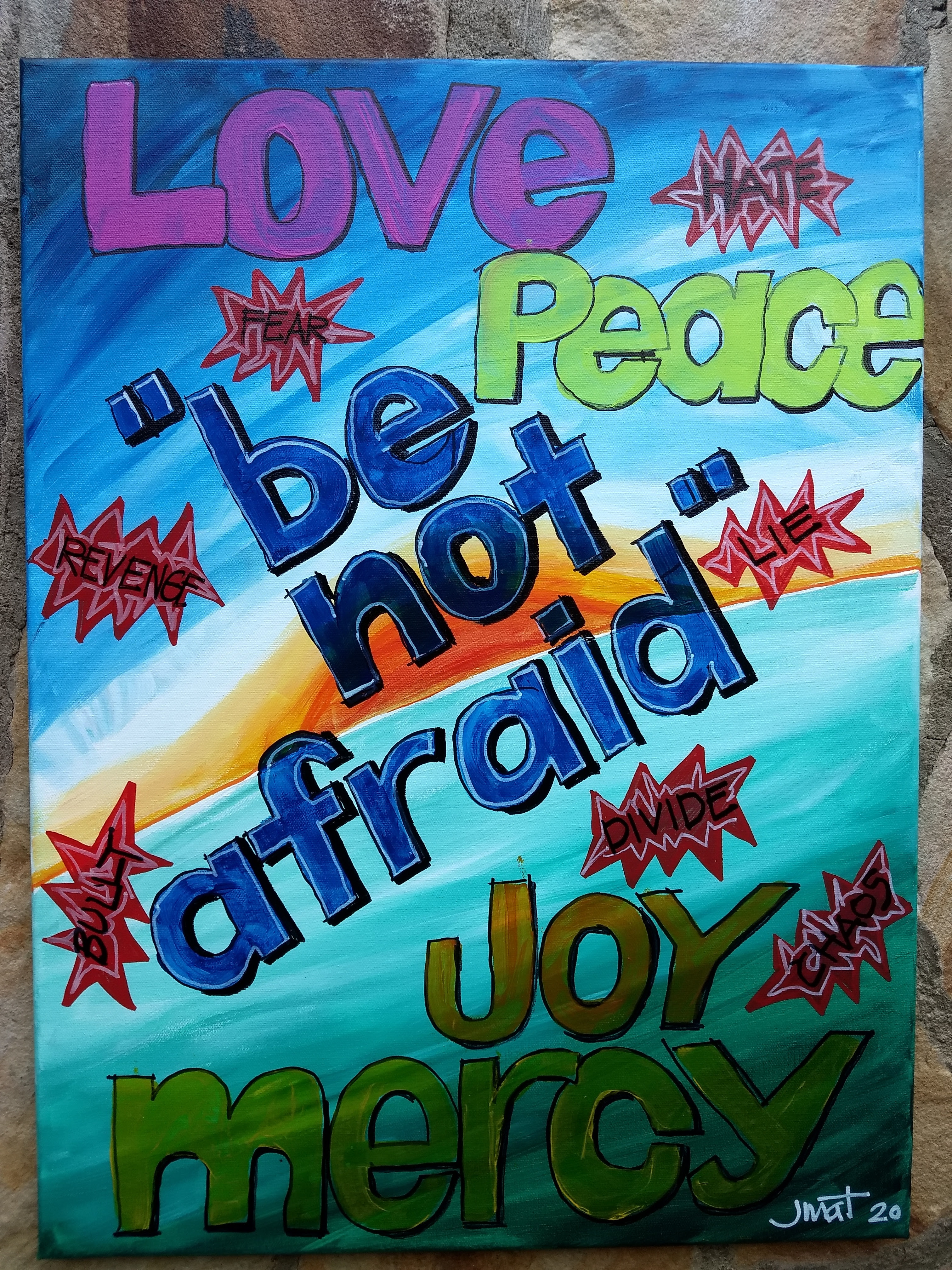Thirty-Third Sunday in Ordinary Time
“Master, I knew that you were a harsh man, reaping where you did not sow, and gathering where you did not scatter seed; so I was afraid, and I went and hid your talent in the ground.” Mt. 25: 26
“I was afraid ….”
Prior to the coronavirus pandemic, more than 20 percent of Americans had symptoms of depression or anxiety. Researchers now estimate that number has tripled in just the past month!!
As one psychiatrist at Northwestern medical school reported, “the present unrest in our country has significantly increased calls relating to anxiety (fear) and depression to the point that we’ve had more new patients and more return patients than ever before.”
She went on to say: “While our homes are supposed to be the place where we feel safe and protected, the recent violence, both verbal and physical, coupled with the pandemic, has caused people to become overly alert and afraid. Many people now feel their homes and their families have been invaded. They feel unsafe.”
Added to this pandemic and social unrest is the reality of election stress, which only further exacerbates the mental health crisis America has been struggling with for some time. As one psychiatrist puts it, “People across political divides believe that leaders from the opposite side pose a significant threat to their way of life and the well-being of our country as a whole.”
Amid all this, we are presented today with a Gospel reading often considered as one of the best known of all Jesus’ teachings. It is surely timely for us to re-read these words in the light of all we’re faced with these days because this Gospel contains a very positive message.
When read carefully, its message encourages people who have faced very difficult life experiences with these imperatives:
No to fearfulness. Yes to creativity.
No to an uncreative life. Yes to an active response to God.
No to an obsession with security. Yes to a risky effort to change the world.
No to a faith buried in conformity. Yes to a committed following of Jesus.
When it comes to living out the Christian life to its fullest, Jesus’ message in this passage is clear:
The greatest danger for us in the midst of fearful experiences is letting our faith remain frozen and hidden away, closing out the radicality of the Gospel message.
The full focus of this Gospel passage is really on the third servant – the one who reports to his master that “I was afraid, so I went and hid your talent in the ground.”
Contextually, it’s important to understand how prominent fear was for the Jewish-Christian community Matthew addresses in this Gospel since what many of us are experiencing right now in our lives is similar to their life situation.
All the more reason, then, for us to carefully consider the power and destructive nature of fear.
Some 2000 years ago, the fear rampant among the Jewish people who had converted to Christianity when Matthew was writing was the trauma, the prolonged horror caused by the destruction of the Jewish Temple.
It’s difficult for us today to imagine the splendor, the grandeur, the beauty of the Temple of Jerusalem that Jesus regularly speaks of in the Gospels.
During Jesus’ time, though, it was considered the most magnificent temple ever built in the entire history of mankind!
Here are just a few of its dimensions:
The west wall of the Temple was the length of 4.5 football fields; the back of the Temple stood 20 stories high; the stones used to build it weighed up to 400 tons; the materials used to construct it were white marble and gold, with bronze entrance doors “so stunning that when the sun shone upon them people would be blinded by the light.” And then there was perhaps the biggest jaw dropper of all: the entire building, with its many indoor gardens, could house 1 million people!!!
This Temple has been described by one historian as “a building so wondrous that even today its construction remains a mystery. Pilgrims were mesmerized by its unforgettable splendor.”
Ironically, the very people who built it, the Romans, were the very same ones who burned it to the ground in 70 C.E.
One Roman historian described the destruction of this astonishing Temple this way: “ … no other city has ever endured such horrors, and no generation in all of history has fathered such wickedness.”
The memory of all this was burned into the minds of every Jewish person, not only in first century Palestine, but perhaps even to this day. Only the holocaust some 1900 years later would surpass it.
With this remembrance branded into their brain, fear was an almost automatic response on the part of the Jewish people, especially among those who had witnessed it and deserted Jerusalem because of it.
Those were also the very people that would have first heard this Gospel writing – a people riddled with fear, and maybe even terror; a people now faced with the crisis of reconstructing their lives of faith through the message of Jesus.
Fear was in the way. Fear was causing some Jews to abandon their newfound faith in the Gospel of Jesus. Fear was at the root of many burying their newfound faith in the sand, as it were.
What Matthew wanted more than anything else in writing this Gospel story was to transform their fear into trust, to move people from an experience of terror into one of faith, to encourage us all to share what we have been given – indeed even our very selves – for the good of all.
This is why today’s Gospel is a timely one for us.
So many American people are, like the Jews of the first century, afraid. Our fears, our heartaches, are many. Our pandemic has deprived us of so much that we took for granted: our family life, our social life, our religious life. Our political experience has caused ruptures in our country’s democratic structure. Our racial and economic inequalities have compounded many fractures in our national heritage.
The result, to use the image given in the Gospel story, is the hope that we can, like the man who hid his talents, move from fear to faith, from anxiety to hope, from terror to a deep sense of inner peace.
When we can do that, then we have established a heavenly investment – one, we are promised, with interest!
Ted Wolgamot, Psy.D.
NOTE:
In a country that is now being described by many as “deeply and bitterly divided,” perhaps the hallowed words of Abraham Lincoln, spoken during a time of a division so deep that it caused a Civil War, could help heal some of the wounds we are presently suffering:
“We are not enemies, but friends. We must not be enemies. Though passion may have strained it must not break our bonds of affection. The mystic chords of memory, stretching from every battlefield and patriot grave to every living heart and hearthstone all over this broad land, will yet swell the chorus of the Union, when again touched, as surely they will be, by the better angels of our nature.”
NOTE 2:
Fr. Richard Rohr writes:
“Love is perhaps the last thing anyone wants to be reminded of in these days following the election in the United States. Yet our resistance to love is precisely why we need to talk about it! We have strayed so far from love; and yet, love is the essence of who we are, and how we are called to treat one another.
‘Whoever is without love does not know God, for God is love’ (1 John 4:8).
In the Gospel of John, Jesus takes this to its logical conclusion. He does not say, ‘There is no greater love than to love God.’ Instead he says, ‘There is no greater love than to lay down your life for your friends.’ (Jn. 15:13).




